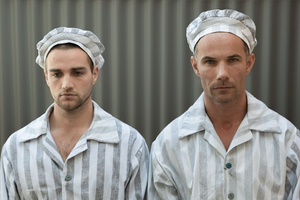 Reviewed by Ewart Shaw, Friday 13th November 2020.
Reviewed by Ewart Shaw, Friday 13th November 2020.
Lest we forget that the Holocaust, which eviscerated European Jewry, had a dress rehearsal, Independent Theatre brings us
Bent,
Martin Sherman's confronting play about the humiliation and murder of thousands of homosexuals. In the concentration camps, they were regarded even by the other prisoners with such loathing that Max, played by the outstanding Matt Hyde, chooses to pass himself off as a Jew in order to wear the yellow star and not the pink triangle.
The opening night was poignantly timed to the Feast Gay and Lesbian Festival, but days, only days, from November 11th and the opening of Adelaide's Holocaust Museum.
There's an old expression; 'gallows humour, the joke you make before the trap opens and the noose tightens'. Sherman's text is laced with the blackest of black humour that makes the play just bearable. None of the horrifying and brutal events described or shown in this play is an exaggeration of the astounding terror visited by the Nazis on their victims.
Matt Hyde is Max, a small-time fixer and party animal who lives with Rudi, a cabaret dancer. Max is the estranged only son of a wealthy button manufacturer. He makes deals. At first, he turns down a chance of escape. He wants two sets of false papers, and two tickets to Amsterdam but, on the train to Dachau, he abandons Rudi, who is beaten to death. On the train to Dachau, he encounters Horst, and will make a deal that brings them together to the end.
Hyde is a highly experienced, well-travelled actor, and his skill at every level is vital. He carries the play, barely off stage for a moment. Rob Croser has given Lindsay Prodea the opportunity in this and earlier productions to extend his range beyond his usual musicals and cabaret milieu. Now, as Rudi, he's a cabaret performer in 1930's Berlin. His youthful naïveté is a very effective foil to Hyde's debauched existence. Tom Murdock, a recent Flinders University drama graduate, is mesmerising as Horst.
While the first act of the play follows Max and Rudi across Germany in locations of increasing vulnerability, the second act is the prison stone-yard. Sherman places Max and his new mate, Horst, behind an electric fence, where they must carry rocks from one side to the other, never speaking, forced to stand to attention for three minutes each hour, or be shot. Max bribed a guard to get Horst sent there. He later gave a high ranking officer a blowjob to get vital medicine for the boy.
Their growing love develops through whispered conversations, sex without touching, as they carry out their arduous task. It's one of the great moments of contemporary theatre, ending, as you can guess, in death and, as Max puts on Horst's pink triangle, discarding his Jewish disguise, he finally becomes his true self. His death on the electric fence is a resurrection.
Eddy Sims appearance, walking casually naked across the stage, a Hitler-Jugend wet dream incarnate, added a note of raw sensuality, before his on-stage murder by soldiers tasked with removing all traces of homosexuals from the armed forces. The Night of the Long Knives was one of Hitler's first strikes against the racially and socially impure whose presence stained his Aryan vision. Patrick Marlin is Greta, the drag artist, safe from persecution, he feels, because he has a wife and children. He can take off the wig and be safe. I'd have liked a better wig for him, but it's a successful cameo.
It's David Roach who proves yet again that he's the finest character actor in the state and perhaps the country. He's Uncle Freddy, a discreet and elderly homosexual who offers Max financial aid, while speculating on the sexual orientation of a man in the park. Again,
Martin Sherman finds an actor just right for the role.
In the speeches of thanks after the premiere, director, Rob Croser, explained that Matt Hyde had drawn his attention to the play and, as live theatre starts to emerge from lockdown, I'm personally very grateful that he did, even though I kept distancing myself emotionally from what was happening on stage.
My recall of the State Theatre Company of South Australia production of 1980 with John Hargeaves and Tom Considine, with
John Edmunds as Uncle Freddie, is a visual one, still very clear. Hearing the words again, following the dramatic unfolding, hammers home the fact that in many parts of the world, and even in suburban Australia, being gay, being a Jew, being an outsider, makes you a target.
There's a short, compact season, with COVID-19 restrictions cutting the audience numbers down. It should be seen and while Independent has next year reasonably set, it should be remounted.
Reader Reviews
To post a comment, you must
register and
login.
 Reviewed by Ewart Shaw, Friday 13th November 2020.
Reviewed by Ewart Shaw, Friday 13th November 2020. Reviewed by Ewart Shaw, Friday 13th November 2020.
Reviewed by Ewart Shaw, Friday 13th November 2020.